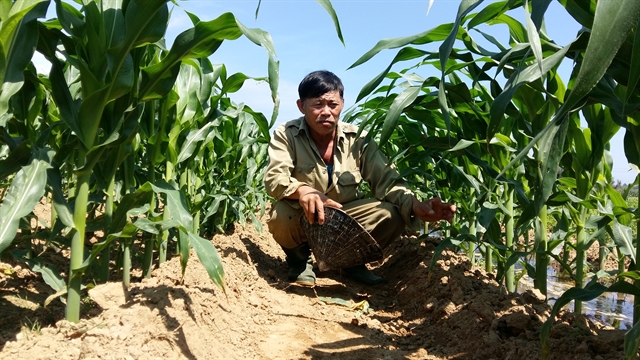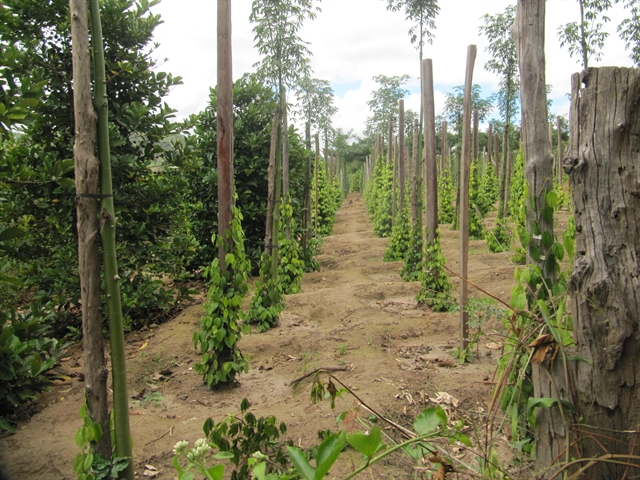 Society
Society

A new project aims to improve climate-resilient irrigation and water security in the Central Highlands and south-central coastal region.

|
| A farmer checks his crop farm in central Việt Nam. VNS Photo Công Thành |
ĐÀ NẴNG — A new project aims to improve climate-resilient irrigation and water security in the Central Highlands and south-central coastal region.
A signing ceremony for the ‘Strengthening the Resilience of Smallholder Agriculture to Climate Change-Induced Water Insecurity in the Central Highlands and South-Central Coast Regions of Việt Nam’ project was recently held by the United Nations Development Programme (UNDP), the Ministry of Agriculture and Rural Development (MARD) and five provinces of Đắk Lắk, Đắk Nông, Khánh Hòa, Ninh Thuận and Bình Thuận.
The project will be financed by the Green Climate Fund (GCF) with a grant of US$30.2 million and leveraged co-financing of $126 million from the ADB and the Government of Việt Nam on modernised irrigation infrastructure.
The awarding of the project reflects the efforts of the Government and the UNDP in leveraging finances for more effective investment in climate resilience. This is the third non-refundable grant project for Việt Nam financially supported by GCF and technically supported by the UNDP.
The project, which will be carried out between 2021 and 2026 by the five provinces, will directly benefit more than 222,400 people in the five provinces (about 10 per cent of the population of the target provinces) with climate-resilient irrigation, improved water security and livelihood options, increased knowledge of climate risks and resilient agricultural techniques, and access to localised climate advice and market information.
It will also indirectly benefit more than 335,000 women and men with enhanced access to climate risk information, weather, market and agricultural advisories and widespread dissemination of best practices in climate-resilient agriculture.
“UNDP is proud of our strong partnership with the Government of Việt Nam for mobilising international climate finance to accelerate national efforts for building the resilience of communities vulnerable to climate change, with three GCF projects,” said Caitlin Wiesen, UNDP Resident Representative in Việt Nam.
“The project will support poor and near-poor farmers in the Central Highlands and south-central coastal regions adapt to increasingly severe droughts, exacerbated by climate change. This complements the ongoing GCF project UNDP supports in 28 coastal provinces for building the resilience of poor communities vulnerable to floods and storms,” she said.

|
| Pepper farms in Central Highlands region of Việt Nam often face water shortage in dry season. The region has been improved the water security by support from UNDP and international sponsors. VNS Photo Công Thành |
Việt Nam is particularly vulnerable to climate change. The Central Highlands and south-central coast are expected to experience wetter wet seasons and drier dry seasons with an increased risk of severe droughts. This means farmers will face reduced crop productivity, which in turn hurts food security and incomes.
"Việt Nam is among the countries most affected by climate change and extreme weather events such as floods and droughts are occurring more frequently," said Deputy Minister of Agriculture and Rural Development Nguyễn Hoàng Hiệp.
"This innovative project will address the critical issues of water insecurity for smallholder agriculture and will support our farmers, especially women, ethnic minority and poor farmers, to become more resilient to cope with increasing climate risks to agricultural production,"
Vice-Chairman of Ninh Thuận People’s Committee, Lê Huyên, said: “This project will address the emerging needs of the farmers, not just in Ninh Thuận Province, but in the five project provinces.
“Through this project, farmers will gain access to stable water sources and be better equipped with advanced farming techniques for effective climate-smart agriculture production that will be needed for continued economic development.”
Agriculture and water resources are the foundation of the livelihoods of about 64 per cent of the people in the Central Highlands of Việt Nam, especially ethnic minorities. Around 48 per cent of the people in the south-central coast region rely on agriculture for their livelihoods.
The Central Highlands are susceptible to changes in water availability in the dry season when there is little rain and low river flow. Only about 27.8 per cent of the region’s agricultural land is irrigated.
The south-central coast is the driest area of the country with a long dry season, the lowest rainfall, and a relatively small river system. Only about 30 per cent of agricultural land is irrigated. VNS




